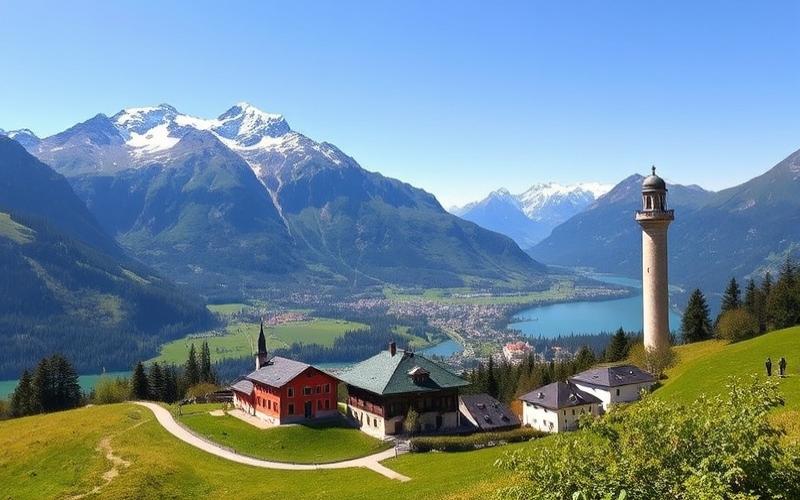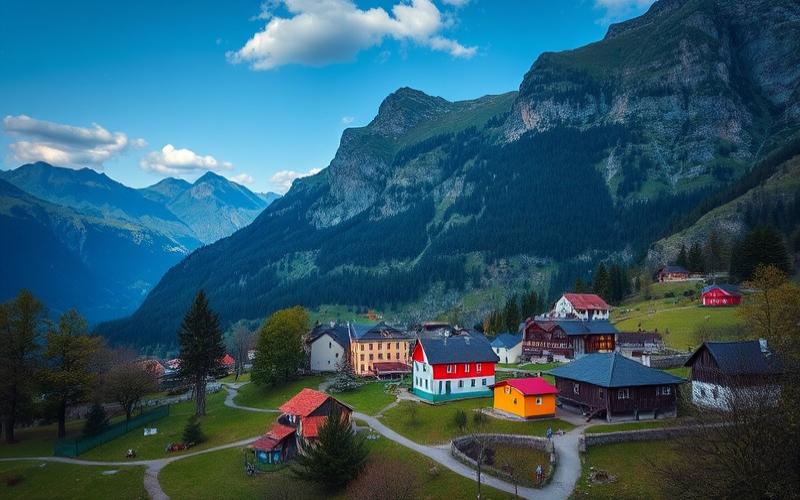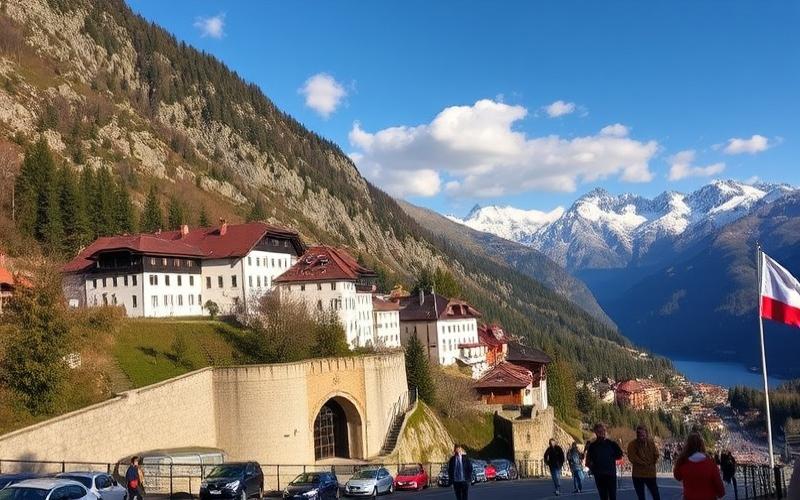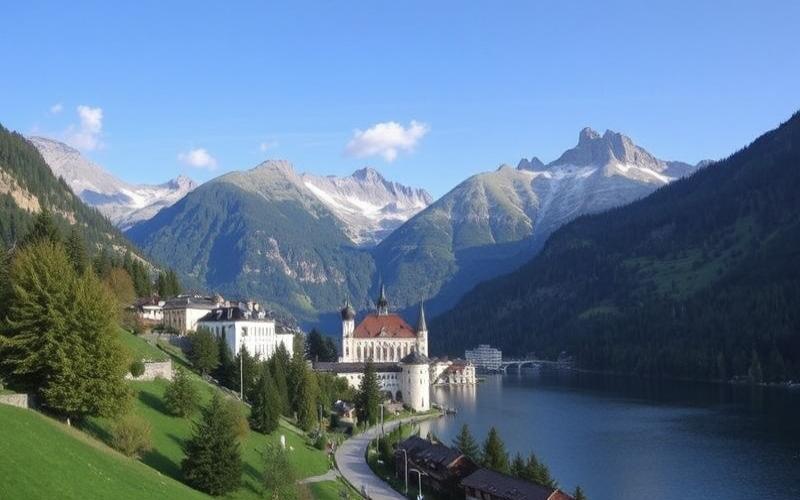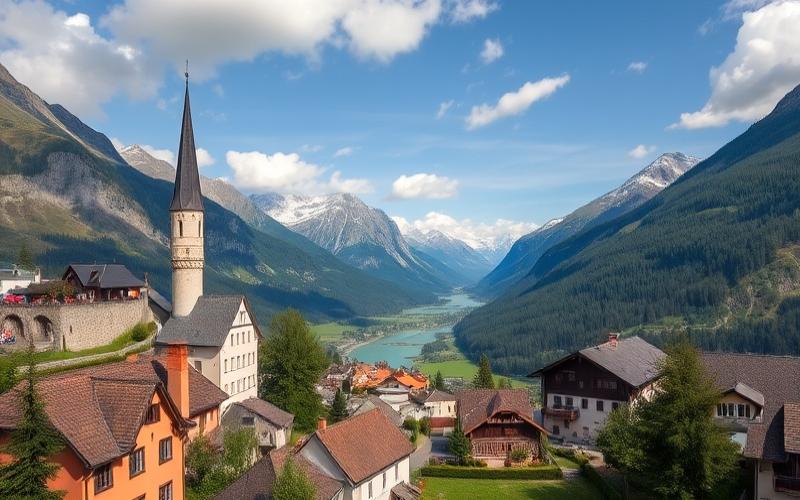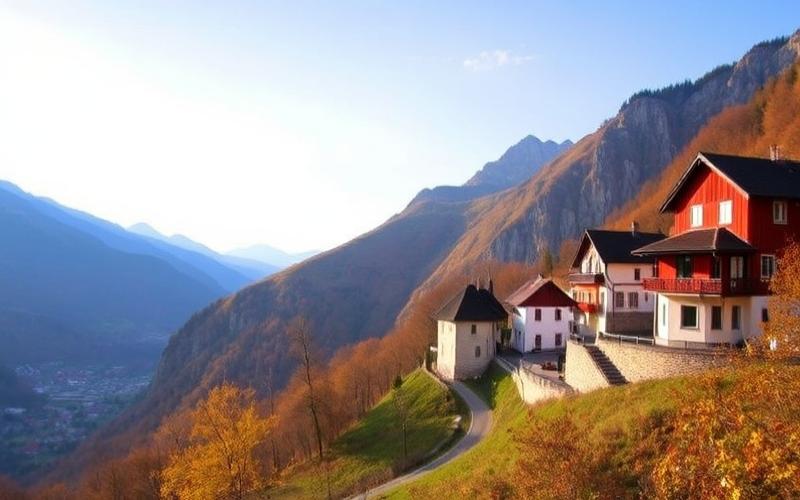
 Published on and written by Cyril Jarnias
Published on and written by Cyril Jarnias
The Principality of Liechtenstein: An Exceptional but Costly Living Environment
Nestled between Switzerland and Austria, the Principality of Liechtenstein, though small in size, attracts many expatriates seeking new opportunities. However, settling in this microstate can prove to be a significant financial challenge.
Good to Know:
With one of the highest cost of living indices in Europe, it’s crucial to fully understand the unavoidable expenses that expatriates face.
From high rents to expensive healthcare costs and transportation, every aspect of daily life can heavily impact your wallet. This guide provides an essential overview to anticipate these costs and better plan your future in this country with its exceptional living environment.
Discovering the Cost of Living in Liechtenstein: A Detailed Overview
Liechtenstein is known for its high cost of living, more than 50% higher than in France, but it comes with greater local purchasing power. Expatriates must therefore anticipate their main expenses well to adapt their budget accordingly.
Housing
The real estate market in Liechtenstein is very tight, with rents and purchase prices significantly higher than those in neighboring countries like Switzerland or Austria. An average apartment (2-3 rooms) for rent can cost between 1,500 and 2,500 CHF per month depending on location and standard. For comparison, in neighboring Switzerland (outside major cities), a similar home often ranges between 1,200 and 2,000 CHF monthly.
Food
Grocery shopping is also expensive: a couple typically spends between 800 and 1,200 CHF per month on groceries. Restaurants are pricey, with main courses around 25-40 CHF. In comparison, in Austria or some rural Swiss regions, these amounts can be nearly half.
Transportation
The public network is limited but efficient; a monthly pass for local transport costs around 80-100 CHF. However, frequent bus use remains rare among expatriates who prefer personal cars or bicycles in this small country.
Healthcare
Private health insurance is mandatory in Liechtenstein and represents a significant portion of the budget: expect about 300-600 CHF per person each month depending on age and desired coverage level. This system closely resembles that of neighboring Switzerland.
Education
Public schools are free but often reserved for permanent residents; many expatriates therefore opt for private international schools whose annual fees generally range between 15,000 and 30,000 CHF per child – an amount similar to that in German-speaking Switzerland or bordering Austria.
| Expense | Liechtenstein (CHF/month) | Average Switzerland (CHF/month) | Average Austria (EUR/month) |
|---|---|---|---|
| Housing | 1,500–2,500 | 1,200–2,000 | 700–1,400 |
| Food | 800–1,200 | 600–900 | 400–700 |
| Transportation | 80–100 | 70–90 | 40–60 |
| Healthcare | 300–600/person | 250–550/person | – |
| Private education* (*/year) | 15k-30k/year | ~15k-30k/year | ~8k-20k/year |
*For a private international school
Average Salaries
An average gross salary in Liechtenstein ranges around 7,000 to 9,000 CHF monthly depending on the sector – significantly more than in France or even bordering Austria where it’s rather around 3,000 EUR net for an equivalent qualified position. In German-speaking Switzerland near Liechtenstein, the equivalent net average salary can also reach about 5,500 – 7,500 CHF.
Taxes & Duties
The Liechtenstein tax system remains attractive: no wealth tax nor direct inheritance taxes under specific conditions; income tax progresses moderately according to brackets but remains generally low compared to neighboring European countries. However, some local social charges may supplement these minimal taxes.
Testimonials & Anecdotes
“Having arrived in Liechtenstein from Paris after several years in Germany… I was surprised by two things: everything costs a lot here – even buying a baguette! But you get used to it quickly thanks to the high salaries that largely compensate,” shares Sophie R., a French expatriate.
“Easy access to medical care was essential when we decided to move here with our children… But be careful with private health insurance! They quickly add up to several hundred each month if you have a whole family,” notes Marc W., a German engineer.
“You live well here if you earn a decent living… otherwise it’s complicated! The landlord asked for three months’ deposit before our arrival,” adds Anna K., a Polish consultant working in international finance based near Vaduz.
In Practical Conclusion:
- Estimated overall daily cost:
- Solo traveler/expatriate/couple without children = ~174/186 € (~186/1900 USD)/day including standard accommodations + meals + local transport.
- Typical family = quickly plan for >10K CHFs/month all charges included excluding exceptional leisure activities.
Good to Know:
The cost of living in Liechtenstein is significantly high, particularly regarding housing where rents can be comparable to neighboring Swiss cities like Zurich. A one-bedroom apartment often costs at least 1,500 CHF per month. In terms of food, although local products are of high quality, prices are generally higher than those found in Germany or Austria. Public transportation is well-developed and relatively affordable, but many expatriates prefer using a car due to the proximity of borders. Healthcare, comparable in quality to Switzerland, can however be costly without good insurance. Public education is free, but some expatriates prefer private international schools, whose fees can be high. Salaries are competitive, often higher than in neighboring countries, which helps offset expenses. Taxes are moderate, but duties can vary depending on professional and personal situation. Expatriate testimonials mention the need to plan expenses in advance to avoid surprises and emphasize the importance of enjoying outdoor activities and beautiful landscapes, which are an invaluable asset of life in Liechtenstein.
Comparing Liechtenstein with Other Destinations: Weighing the Cost
The cost of living in Liechtenstein is significantly high, especially compared to other popular European destinations for expatriates like Germany and Austria. However, it is comparable to that of Switzerland, a neighboring country with which it shares several economic and cultural similarities. Here is a detailed comparison of living costs in these countries:
Compared Living Costs
| Country | Cost of Living (% compared to European average) | Housing (average rent for 1-bedroom apartment) | Transport (average cost of a bus ticket) | Groceries (average cost of a basic product basket) |
|---|---|---|---|---|
| Liechtenstein | 156% (about 56% higher than in France) | 1,500 CHF (~ 1,600 €) | 2-3 CHF (~ 2-3 €) | 50-70 CHF (~ 53-74 €) for a basic basket |
| Switzerland | 155% (similar to Liechtenstein) | 1,400 CHF (~ 1,500 €) | 2-3 CHF (~ 2-3 €) | 50-70 CHF (~ 53-74 €) for a basic basket |
| Germany | 90% (about the European average) | 600-800 € | 2-3 € | 30-50 € for a basic basket |
| Austria | 95% (slightly above European average) | 700-1,000 € | 2-3 € | 35-55 € for a basic basket |
Factors Influencing Costs
- Proximity to financial and economic centers: Liechtenstein and Switzerland are close to Zurich, a major financial center, which can influence housing and service costs.
- Tax policies: Liechtenstein has low taxes, attracting expatriates seeking favorable tax conditions. However, this doesn’t necessarily reduce the cost of living.
Examples of Typical Expenses
- Housing: A 1-bedroom apartment costs about 1,500 CHF (~ 1,600 €) per month in Liechtenstein, compared to 600-800 € in Germany.
- Transport: A bus ticket costs about 2-3 CHF (~ 2-3 €) in Liechtenstein and Switzerland, similar to Germany and Austria.
- Groceries: A basic basket costs between 50-70 CHF (~ 53-74 €) in Liechtenstein, similar to Switzerland, but more expensive than in Germany or Austria.
Influence on Expatriate Choices
Differences in cost of living can influence expatriates’ choices depending on their priorities:
- High salaries: Liechtenstein offers very competitive salaries, partially offsetting the high costs.
- Tax advantages: Liechtenstein’s attractive tax policies can attract those looking to minimize their taxes.
- Quality of life: Economic stability and quality of life in Liechtenstein are often cited as major advantages.
Good to Know:
Liechtenstein, though small, offers a cost of living comparable to Switzerland, often higher than that of Germany or Austria. Housing is particularly expensive there, with rents often similar to those in Zurich, while Munich or Vienna offer more affordable options. Transportation and public services in Liechtenstein are also costly, influenced by proximity to Switzerland and advantageous but constraining tax policies. Grocery shopping costs almost as much as in Switzerland, but expatriates find cheaper products in Germany. Regarding leisure, a restaurant meal or cultural outing heavily impacts the budget, due to limited but high-quality offerings. To give an idea, an expatriate might spend about 1,500 CHF per month for a one-bedroom apartment in Liechtenstein, compared to about 1,200 EUR in Munich and 900 EUR in Vienna. These economic differences, influenced by factors like low tax rates and Liechtenstein’s economic stability, may encourage expatriates to carefully weigh the cost against their personal priorities, such as quality of life or proximity to economic centers.
What Budget Should an Expatriate Plan for in Liechtenstein?
Liechtenstein presents a high cost of living, to be carefully anticipated during expatriation.
A comfortable monthly budget generally ranges between 3,000 and 5,000 USD per person, taking into account the main expense categories.
| Expense Category | Estimated Cost (monthly or occasional) | Details/Observations |
|---|---|---|
| Housing (rental) | Very high | Capital (Vaduz) more expensive than rural areas |
| 1-bedroom apartment city center | ~2,000–2,800 USD/month | Luxury and high standard |
| 1-bedroom apartment outside center | ~1,500–1,800 USD/month | Slightly cheaper |
| Family house | >3,500 USD/month | Rare on the market |
| Real estate purchase | Very high prices | Few offers available |
| Food | High | Superior quality, mostly imported products; average basket well above European average |
| Transportation | High | Efficient but costly network; expensive gas and frequent tolls |
| Public transport pass | Variable (~100 CHF/month) | Efficient intercity buses |
| Personal vehicle | Significant costs | Mandatory car insurance, expensive fuel |
| Healthcare & Insurance | Mandatory and expensive | High-performing system based on Swiss private insurance; high premiums |
| Health insurance premiums | >300 CHF/person/month | Depends on chosen contract and profile |
Utilities: Electricity, water, heating, Internet — often included in rents but can represent up to about 250 CHF/month, depending on home size.
Groceries: For a single person, plan between 400 and 600 CHF/month, more for a family.
Leisure & Culture: Paid access to museums/galleries (~10–20 CHF/entry), expensive restaurants (standard meal >30 CHF), popular sports/outdoor activities but sometimes costly.
City/countryside differences:
- Vaduz concentrates the highest prices for both housing and food.
- Rural areas offer slightly lower rents but fewer cultural or commercial options.
Practical List to Optimize Your Budget:
- Prefer shared housing or move away from major urban centers
- Shop in discount supermarkets in neighboring Switzerland or Austria when possible
- Enjoy free activities (alpine hikes)
- Use an annual transport pass rather than a personal vehicle if possible
- Regularly compare health insurance offers
- Subscribe to an annual culture/museum card if outings are frequent
⧫⧫ To live peacefully in Liechtenstein while managing your finances,
it is crucial to anticipate each budget item,
systematically compare before any commitment,
and fully enjoy the natural setting freely offered by the country. ⧫⧫
Good to Know:
Living in Liechtenstein as an expatriate requires a well-planned budget due to the high cost of living. Housing constitutes a significant portion of expenses, with an average monthly rent of about 2,000 EUR for a one-bedroom apartment in main cities like Vaduz, while rural areas offer slightly cheaper options. Grocery costs are comparable to those in neighboring countries, but utilities such as electricity and water can vary by season, hence the importance of good energy management. Transportation is generally affordable thanks to an efficient bus network, although owning a car entails additional costs like insurance and maintenance. Healthcare, although high quality, requires private insurance, whose premiums vary with age and coverage level. For leisure, regular restaurant outings or cultural activities can quickly add up; prioritizing free events or local discounts is a good idea. Finally, settling in less central areas can allow significant savings while offering a pleasant living environment.
Disclaimer: The information provided on this website is for informational purposes only and does not constitute financial, legal, or professional advice. We encourage you to consult qualified experts before making any investment, real estate, or expatriation decisions. Although we strive to maintain up-to-date and accurate information, we do not guarantee the completeness, accuracy, or timeliness of the proposed content. As investment and expatriation involve risks, we disclaim any liability for potential losses or damages arising from the use of this site. Your use of this site confirms your acceptance of these terms and your understanding of the associated risks.




